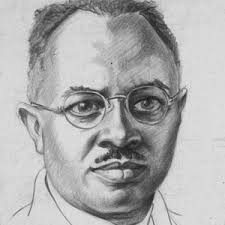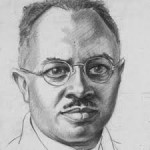About E. Franklin Frazier

About E. Franklin Frazier…originally published on what-when-how…Franklin Frazier, one of the most prominent African American sociologists of the early twentieth century, studied at Howard University (BA 1916), Clark University (MA 1920), and the University of Chicago (PhD 1931).
FRAZIER, E. FRANKLIN (Social Science) 1894-1962
After completing his studies he spent most of his career at Howard University, where he became the chairperson of the Department of Sociology in 1934. He remained at Howard until his death. His central contribution to sociology was the formalizing of a research tradition on the African American family, which he first began to pursue seriously in his dissertation, “The Negro Family in Chicago.” That study resulted in a book of the same title, published in 1932. Frazier expanded his contributions on the topic by publishing The Negro Family in the United States (1939) and Negro Youth at the Crossways (1940). He also contributed to the field of race relations and race theory more generally, perhaps best exemplified by his publications “Sociological Theory and Race Relations” (1947) and Race and Culture Contacts in the Modern World (1957).
Frazer interested in big pictue too
Frazier’s primary data sources were case histories and census statistics. Rather than employing micro-level analyses, however, he utilized this material to construct social organizational portraits of the African American family and, more generally, African American social life. As he conducted most of his research in the midst of the twentieth-century rural-to-urban migration of African Americans, Frazier’s social organizational perspective allowed him to offer robust and penetrating commentaries about the means of mechanisms of their adjustment to the hyper-industrializing urban sphere—the manner by which African Americans adjusted to industrialized urban societies after leaving the largely rural South. In doing so, he emphasized the social organizational shortcomings of the African American community as it transferred to a mostly northern and urban milieu.
About E. Franklin Frazer
Frazier essentially regarded African American migration to the city as an adaptational challenge for the black American family, and he argued that a history of social disorganization in the South, followed by turbulent efforts at reorganization in the nonsouthern, urban sphere, encapsulated the situation of the black American family’s confrontation with modern urban America. Frazier believed that the hardships of social and economic adjustment were the causal factors of crime, vice, illegitimacy, and delinquency. Because he asserted that social disorganization and pathology were a result of the African American community’s adjustment to new geographic terrain, Frazier was regarded by many later readers of his work as a pioneering conservative voice on the cultural dimensions of African American life. In fact, Frazier’s work has been regarded as the precursor to later works such as Daniel Patrick Moynihan’s highly controversial 1960s-era study “The Negro Family: A Case for National Action,” which argued that the pathology extant in lower-income African American families was largely due to the absence of an adult male figure.
Frazier was not a cultural theorist to the same extent as certain other scholars of African American life in the early twentieth century (e.g., Allison Davis, St. Claire Drake, W. E. B. Du Bois, and Zora Neale Hurston). However, his emphases in cultural analysis centered on what he perceived to be pathological and maladaptive dimensions of African American family and social life. His assertion that disorganization and pathology were prominent features of African American urban life was partly based on his embracing of the idea that African Americans did not retain any firm cultural roots in Africa. Thus, they were left without a rich, historically grounded cultural foundation in the United States, other than that produced in response to slavery. Accordingly, he regarded African Americans as consistently hampered by racism and social marginalization such that many developed cultural traits that were, if not fatalistic, at least certainly not conducive to social advancement in modern American society.

